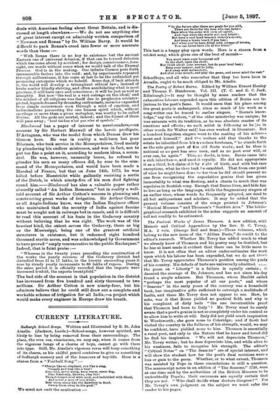The Poetical Works of James Thomson. A new edition, with
Memoir and Critical Appendices by the Rev. D. C. Tovey, M.A. 2 vols. (George Bell and Sons.)—These volumes, which belong to the new issue of the " Aldine Poets," do credit to the editor's research. Whether Mr. Tovey has added much to what we already know of Thomson and his poetry may be doubted, but he has at least made it evident that there can be little more to know. It is not often that an editor under-estimates the work upon which his labour has been expended, but we do not think that Mr. Tovey appreciates Thomson's position among the roeta of his country. His defects of taste are universally admitted.
the poem on " Liberty " is a failure is equally certain ; it daunted the courage of Dr. Johnson, and has not since his day found a single admirer. But Thomson, whom Hazlitt called "perhaps the most popular of all our poets," and whose "Seasons" in the early years of the century was a household book, has imaginative gifts sufficient to outweigh a multitude of faults, and these Mr. Tovey does not appear to see. How, he asks, was it that Rome yielded no poetical field, and why is his complaint of dirty beds " the one incontestible proof that Thomson had been to Italy" ? Mr. Tovey must be surely aware that a poet's genius is not so completely under his control as to allow him to write at will. Italy did not yield much inspiration to Wordsworth; she gave none to Coleridge; and if Scott had visited the country in the fullness of his strength, would, we may be confident, have yielded none to him. Thomson is essentially a rural poet, and only in the Nature that he knew and loved did he find his inspiration. " We will not depreciate Thomson," Mr. Tovey writes ; but he does depreciate him, and while alive to his weakness, fails to recognise his strength. The editor's " Critical Notes " on " The Seascns " are of special interest, and will show the student how far the poet's final revisions were a loss or gain to the poem. Whether, or to what extent, Thomson was assisted by Pope in these emendations is still a question. The manuscript notes in an edition of "The Seasons," 1738, were at one time said by the authorities of the British Museum to be undoubtedly Pope's ; their successors are equally certain that they are not. " Who shall decide when doctors disagree ?" For Mr. Tovey's own judgment on the subject we must refer the reader to his pages.






































 Previous page
Previous page